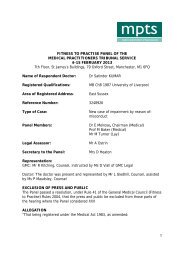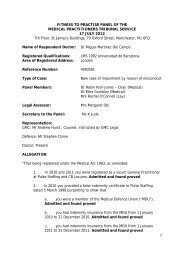PDF document
PDF document
PDF document
You also want an ePaper? Increase the reach of your titles
YUMPU automatically turns print PDFs into web optimized ePapers that Google loves.
comments or suggestions about Patient A’s treatment, nor did it raise any clinical<br />
issues. For this reason, the Panel has concluded that, viewed in isolation, a panel<br />
considering this matter could not properly regard the entry as a sufficiently serious<br />
breach of standards to support a finding of misconduct.<br />
In relation to Paragraph 1b concerning Dr Brier’s unauthorised entry in Patient A’s<br />
drug chart, the Panel took account of the following guidance:-<br />
The New Doctor (2009) at Paragraph 6 states:<br />
“Good clinical care<br />
F1 doctors must:<br />
(a) demonstrate that they recognise personal and professional<br />
limits, and ask for help from senior colleagues…….when necessary.<br />
(b) know about and follow our guidance on the principles of Good<br />
Medical Practice and the standards of competence, care and conduct<br />
expected of doctors registered with the GMC.<br />
(c) demonstrate that they are taking increasing responsibility, under<br />
supervision and with appropriate discussion with colleagues, for patient<br />
care, putting the patient at the centre of their practice by:<br />
…<br />
(ix) using medicines safely and effectively (under supervision)<br />
including giving a clear explanation to patients”<br />
Good Medical Practice (GMP) at Paragraph 5 states that:<br />
“Wherever possible, you should avoid providing medical care to anyone with<br />
whom you have a close personal relationship”<br />
This Panel considers that it would be open to a panel to conclude that Dr Brier’s<br />
conduct is in breach of all of the above guidelines. In particular, the Panel was<br />
concerned that Dr Brier appeared not to have recognised the impropriety involved in<br />
altering the prescription of a patient for whom he was not responsible. This was<br />
done despite Dr Brier having no formal standing within the East Sussex Hospitals<br />
NHS Trust where Patient A was being treated and without the agreement of the<br />
clinicians in charge of the patient. The Panel is satisfied that a panel, properly<br />
advised, could find this action sufficiently serious to amount to misconduct.<br />
The Panel then went on to consider whether this misconduct could properly form the<br />
basis of a finding of impairment. In so doing, it has taken account of the agreed<br />
witness statement of Mr B, Director of Medical Education at Barnet and Chase Farm<br />
Hospitals NHS Trust (Dr Brier’s employers). Mr B stated that he had discussed the<br />
allegations with Dr Brier and that, in his opinion, Dr Brier had genuinely reflected on<br />
the inappropriateness of his behaviour and was unlikely to make similar errors of<br />
4




